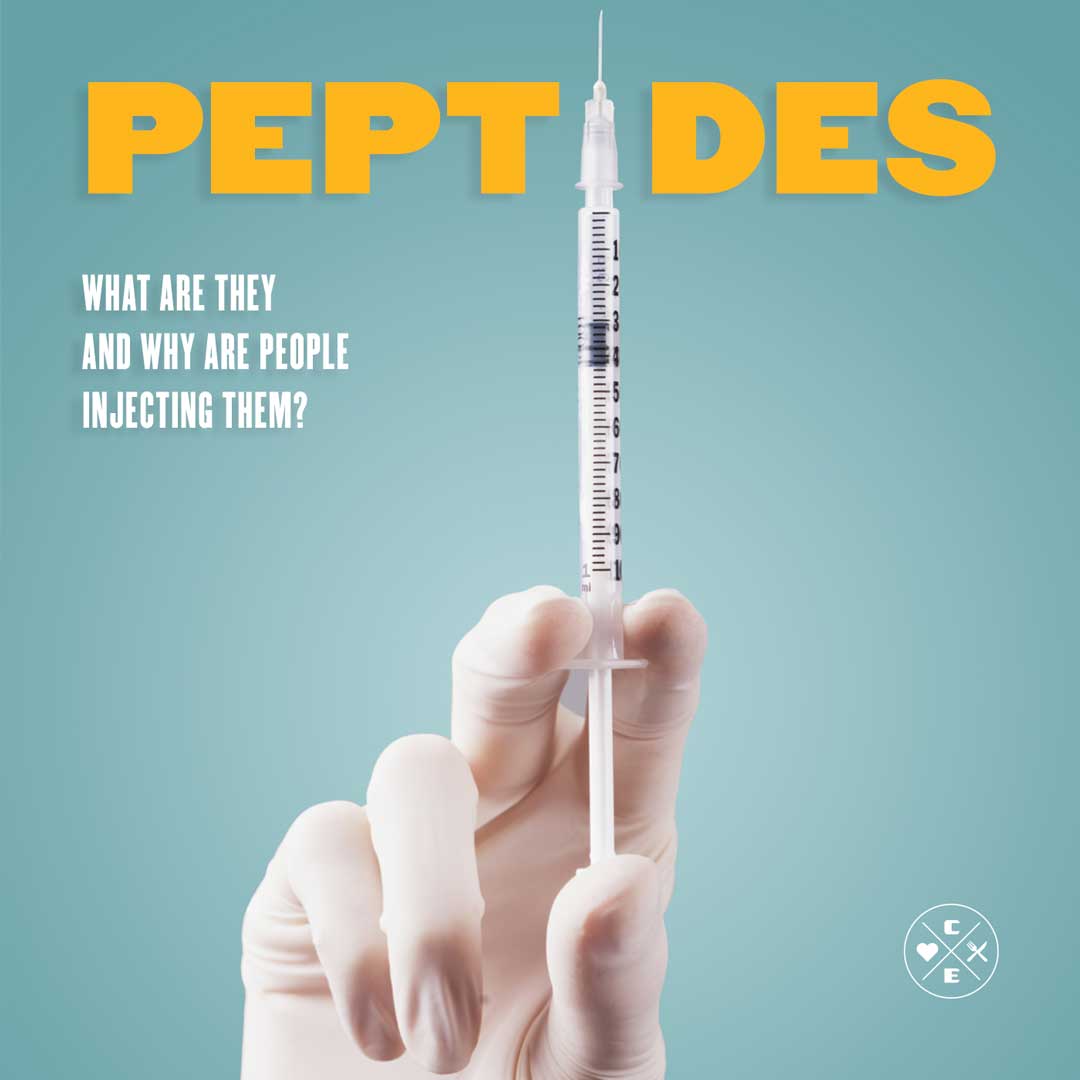
Peptides: What Are They and Why Are People Injecting Them?
Dorothy M. Shirnyl, RND
Nutrition
|
Healthy Lifestyle
12 minute read
You've probably heard whispers about them in gyms, wellness circles, or maybe even from your health-conscious friends. But what exactly are these peptides, and why is everyone suddenly talking about them?
Simply put, peptides are like tiny protein fragments, the building blocks of life itself. They work tirelessly behind the scenes, influencing everything from how we heal to how we age. And now, people are harnessing their power through injections, hoping to achieve a range of benefits – from faster muscle recovery to glowing skin.
But are peptide injections the miracle solution they're often touted to be? In this blog post, we'll cut through the hype and explore the science behind peptides. We'll look at what they are, how they work, and the evidence supporting their various uses. We'll also discuss the potential risks and controversies surrounding their use, so you can make informed decisions about your health and fitness journey.
Peptides: What Are They?
Peptides are, at their core, short chains of amino acids - the very building blocks of proteins. If you imagine proteins as elaborate necklaces, then peptides are the shorter, more delicate chains. While proteins can be composed of hundreds or even thousands of amino acids, peptides typically contain anywhere from two to fifty. It's this difference in size that gives peptides their unique properties and potential benefits.
How Do Peptides Function in the Body?
Peptides act as the body's internal messaging system, playing a vital role in countless physiological processes. Their primary function lies in cellular communication and regulation. Think of them like tiny keys, each with a unique shape designed to fit into specific locks or receptors on the surface of cells.
When a peptide binds to its matching receptor, it triggers a cascade of events inside the cell, much like a domino effect. This signaling process allows cells to communicate with each other, coordinating essential functions such as:
- Growth and Development. Peptides like growth hormone stimulate cell growth and tissue repair, crucial for building muscle, maintaining bone health, and healing injuries.
- Metabolism. Peptides like insulin and glucagon regulate blood sugar levels, ensuring your body has a steady supply of energy.
- Immune Function. Peptides play a key role in the immune system, helping to fight off infections and regulate inflammation.
- Mood and Behavior. Peptides like endorphins and dopamine influence your mood, emotions, and even sleep patterns.
Types of Peptides
Peptides come in various types, each with its own specific role:
- Signaling peptides. These peptides act as messengers, transmitting information between cells and tissues. They regulate crucial processes like growth, development, and hormone production.
- Carrier peptides. These peptides act as transporters, helping to move essential nutrients and other molecules across cell membranes.
- Bioactive peptides. This broad category includes peptides that exhibit specific biological activities, such as antimicrobial, antioxidant, or anti-inflammatory properties.
While peptides are naturally present in our bodies, they can also be found in various food sources or created synthetically in a lab. See the difference between the two on this table below:
Feature | Naturally Occurring Peptides | Synthetic Peptides |
Origin | Derived from food sources (meat, fish, dairy, plants) | Manufactured in a laboratory |
Examples | Collagen peptides, creatine peptides, whey protein peptides | BPC-157, IGF-1, Melanotan |
Benefits | Readily available through diet, often considered safer, offer a range of health benefits | Can be designed for specific functions, offer higher concentrations and precise dosages |
Considerations | The amount obtained from food may be limited, absorption and bioavailability can vary | May require injection, potential for side effects and interactions, regulatory status and quality control can be concerns |
The Science Behind Peptide Injections
Mechanism of Action
Peptide injections offer a targeted and efficient delivery method, bypassing the digestive process that oral supplements have to navigate. When injected, peptides enter the bloodstream or muscle tissue directly, allowing for rapid absorption and a higher percentage of the active peptide reaching its intended destination. This direct access can lead to more noticeable and potentially faster effects.
There are two main methods of peptide injection:
- Subcutaneous. These injections are administered just under the skin, into the fatty layer. This method is often favored for peptides that require a slower, more sustained release, providing longer-lasting effects.
- Intramuscular. Injections are delivered directly into the muscle. This can result in faster absorption and a quicker onset of action, although the effects may not last as long as with subcutaneous injections.
The choice between these two methods typically depends on the specific peptide, its properties, and the desired outcome. It's essential to consult with a healthcare professional who can guide you on the appropriate injection method and dosage for your individual needs and goals.
Common Peptides Used For Injections
Let's explore a few of the popular peptides frequently used for injection, along with their intended benefits:
- BPC-157. This peptide, derived from a protective protein found in the stomach lining, has garnered attention for its potential to promote healing and tissue repair. It's being investigated for its possible benefits in addressing injuries, inflammation, and even gut health.
- IGF-1 (Insulin-like Growth Factor 1). A naturally occurring hormone crucial for growth and development, IGF-1 is sometimes used in synthetic form with the goal of increasing muscle mass, improving recovery, and potentially combating some effects of aging.
- Melanotan. This peptide stimulates the production of melanin, the pigment responsible for skin tanning. While primarily sought after for its cosmetic effects, it could also offer some protection against sun damage.
So, it's important to remember that research on these peptides is ongoing, and while they hold promise, it's crucial to weigh the potential benefits against the risks.
Why Are People Injecting Peptides?
Beyond the realm of performance enhancement, peptide injections are gaining recognition for their potential in treating various medical conditions, offering hope to individuals seeking alternative or complementary therapies. Here’s how peptides are used:
For Medical Use
- Pain Management. Peptides like BPC-157 show promise in reducing inflammation and promoting tissue repair, potentially offering relief for those suffering from chronic pain conditions like arthritis or tendonitis.
- Muscle Growth and Recovery. For individuals with muscle-wasting diseases or those recovering from injuries, peptides like IGF-1 and growth hormone secretagogues (GHRPs) are being investigated for their potential to stimulate muscle growth and accelerate the healing process.
- Wound Healing. The ability of certain peptides to enhance collagen production and tissue regeneration makes them attractive candidates for improving wound healing, particularly in chronic or slow-healing wounds.
- Bone Health. Peptides that stimulate bone growth, like teriparatide (a synthetic form of parathyroid hormone), have been FDA-approved for treating osteoporosis, a condition characterized by decreased bone density and increased fracture risk.
Furthermore, research is also exploring the potential of peptides in managing a wide range of other conditions, including diabetes, autoimmune diseases, and even certain types of cancer.
For Aesthetic and Performance Enhancement
The fitness and bodybuilding communities have embraced peptides for their potential to push the boundaries of physical performance and achieve aesthetic goals.
- Muscle Building and Strength Gains. Peptides like IGF-1 and GHRPs can potentially boost muscle growth and strength. This can aid in building lean muscle mass and enhancing athletic performance.
- Fat Loss and Body Recomposition. Some peptides are believed to accelerate fat burning and improve metabolism, contributing to weight loss and a more sculpted physique.
- Anti-Aging and Skin Health. The use of collagen-stimulating peptides and other anti-aging peptides aims to reduce wrinkles, improve skin elasticity, and promote a more youthful appearance.
While these potential benefits are enticing, it's important to approach them with a balanced perspective. It's crucial to weigh the potential gains against the risks and the lack of long-term studies on the effects of peptide use for aesthetic and performance purposes.
For Weight Loss and Metabolic Benefits
With obesity and metabolic disorders on the rise, peptides have emerged as a potential tool in the quest for weight management and improved metabolic health.
- Appetite Control. Some peptides, such as GLP-1 receptor agonists, may influence appetite regulation, making it easier to stick to a healthy diet and manage food cravings.
- Fat Burning and Metabolism. Certain peptides are believed to stimulate metabolism and increase the breakdown of fat, potentially aiding in weight loss efforts.
While some research shows promising results, it's essential to remember that peptides are not a magic solution.
Risks and Controversies
As with any emerging field, peptide therapy is not without its risks and controversies. It's essential to be aware of these potential downsides and make informed decisions before embarking on any peptide treatment.
Potential Side Effects
- Injection Site Reactions. As with any injection, there's a possibility of localized reactions such as redness, swelling, or pain at the injection site.
- Allergic Reactions. Though rare, some individuals may experience allergic reactions to certain peptides or the additives in the injection solution.
- Hormonal Imbalances. Peptides that interact with the endocrine system can potentially disrupt hormonal balance if not used responsibly and under proper medical guidance.
- Digestive Issues. Some peptides might lead to gastrointestinal side effects like nausea, vomiting, or diarrhea.
Regulatory Status and Quality Control Issues
One of the most pressing concerns surrounding peptide injections lies in the murky waters of regulation and quality control.
Unlike traditional medications, the regulatory status of peptides varies significantly from country to country, and even within regions. Some peptides may be classified as prescription drugs, requiring a doctor's oversight, while others fall under the less stringent category of dietary supplements. This patchwork of regulations creates confusion and potential risks for consumers.
Also, the lack of uniform regulation opens the door to concerns about the quality and purity of peptide products on the market. Without strict oversight, there's a risk of contamination, incorrect dosages, or even counterfeit products. Thus, it's crucial to source peptides only from reputable suppliers who adhere to strict manufacturing practices and provide third-party testing to verify their claims.
The Food and Drug Administration (FDA) on Peptide Drugs
In the United States, the FDA plays a critical role in regulating peptide drugs. However, its oversight of peptide supplements is less comprehensive. The FDA has taken action against companies making false or misleading claims about peptide supplements, but the responsibility largely falls on consumers to be vigilant and informed.
The dynamic nature of peptide regulation further complicates matters. As research progresses and new peptides emerge, regulations may evolve, making it crucial to stay informed about the latest developments.
The bottom line? When it comes to peptide injections, buyer beware. Always consult with a healthcare professional before starting any peptide therapy, and ensure you source your peptides from reputable suppliers who prioritize quality and safety.
The Future of Peptides
The world of peptide research is buzzing with excitement as scientists delve deeper into the potential of these remarkable molecules. They are exploring the following matters:
- Novel Peptides. Researchers are constantly discovering and developing new peptides with a diverse range of potential applications, from targeted cancer therapies to treatments for neurodegenerative diseases.
- Enhanced Delivery Systems. The quest for improved peptide delivery methods is ongoing, with scientists exploring innovative approaches like oral formulations, nasal sprays, and even microneedle patches to enhance convenience and patient compliance.
- Personalized Medicine. The ability to tailor synthetic peptides to specific needs opens doors to personalized medicine, where treatments can be customized based on an individual's genetic makeup and unique health profile.
Hence, the future of peptide research holds immense promise, with the potential to revolutionize how we treat and prevent a wide array of health conditions.
Trends in the Market
The increasing accessibility and popularity of peptide products are undeniable. From online retailers to compounding pharmacies, peptides are becoming more readily available to consumers. This growing demand underscores the public's interest in exploring new avenues for health and wellness.
However, this accessibility also raises concerns about quality control and the potential for misuse. With less stringent regulation compared to traditional medications, it's crucial to exercise caution when sourcing peptide products. Rememeber to:
- Choose Reputable Suppliers. Prioritize suppliers who adhere to Good Manufacturing Practices (GMP) and provide third-party testing to verify product purity and potency.
- Consult a Healthcare Professional. Never self-prescribe or self-administer peptides. A qualified healthcare professional can assess your individual needs, recommend appropriate peptides, and monitor your progress to ensure safety and effectiveness.
The future of peptides is bright, but it's important to navigate this evolving landscape with knowledge and discernment. By prioritizing quality, safety, and informed decision-making, you can harness the potential benefits of peptides while minimizing potential risks.
Conclusion
Peptides are rapidly gaining recognition for their potential in promoting health, wellness, and even enhancing performance. Understanding these tiny protein fragments and their diverse applications is crucial for navigating the growing trend of peptide injections. While they offer a promising avenue for addressing various health goals, it's important to prioritize safety and make informed decisions.
Before staring on any peptide therapy, we recomment that you should consult a qualified healthcare professional to ensure it aligns with your individual needs and health status.
Remember, knowledge is key. Stay informed, make responsible choices, and unlock the potential of peptides for a healthier and more vibrant you.
Let's Talk Peptides
Have you tried peptide injections or are you curious about their potential? Share your thoughts and experiences in the comments below! We'd love to hear from you.
Stay ahead of the curve checking out our blog for updates on the latest health and wellness trends.
And don't forget to follow us on social media for more insights and tips on living your best life!



